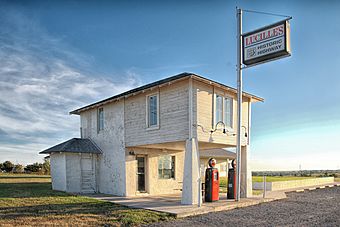Provine Service Station facts for kids
Quick facts for kids |
|
|
Provine Service Station
|
|
 |
|
| Location | 1/2 mile west of Highway 58 |
|---|---|
| Nearest city | Hydro, Oklahoma |
| Area | U.S. Route 66 in Oklahoma |
| Built | 1929 |
| Architect | Carl Ditmore |
| Architectural style | Bungalow/Craftsman |
| MPS | Route 66 and associated historic resources in Oklahoma MPD |
| NRHP reference No. | 97000803 |
| Added to NRHP | July 17, 1997 |
The Provine Service Station, also known as Lucille's Place, is a very old and important filling station on U.S. Route 66 in Oklahoma. It is located near Hydro, Oklahoma. A special lady named Lucille Hamons ran it from 1941 until she passed away in 2000.
Because of her kindness to travelers, Lucille became a legend on Route 66. She helped many people during tough times, especially near the end of the Great Depression. This earned her the special nickname "Mother of the Mother Road." The station was added to the US National Register of Historic Places in 1997.
Contents
History of the Station
The station first opened in 1929. It was built by Carl Ditmore. This building is special because it's a two-story fuel station. The owner's home was right above the gas pumps on the second floor.
In 1934, W.O. and Ida Waldroup bought the station. They changed its name to Provine Service Station. They also added small tourist cabins. These cabins gave travelers five motel rooms to stay in.
Lucille Hamons Takes Over
Lucille and Carl Hamons bought the Provine Station in 1941. This was just a few months before the United States joined World War II. During the war, people had to save fuel and tires. This meant fewer cars were driving on the highway.
Carl Hamons worked as a truck driver. So, Lucille was often alone running the station and the motel. After the war, in the 1950s and 1960s, traffic on Route 66 grew a lot. But then, Interstate 40 was finished in 1971. This new highway went around Route 66, and traffic almost disappeared.
Helping Travelers on Route 66
Lucille Hamons was known for her big heart. She often helped people who were struggling. Many families traveled west on Route 66 looking for jobs. They came from places like Arkansas, Missouri, Kansas, and eastern Oklahoma.
"After Carl got a truck to earn more money, I was alone here to run this place. During this time, people from Arkansas, Missouri, Kansas, and eastern Oklahoma were travelling the road to the West Coast to find jobs. ... Many times I would have people stop that were completely broke, and I would feed them and give them gas in exchange for some appliance or other articles of value they might have. Sometimes I would just buy their old broke-down cars, and then they would catch the bus and head on west looking for work."
—Lucille Hamons
Lucille would sometimes feed people or give them gas. In return, they might give her something valuable they owned. Sometimes, she would even buy their old cars. This helped them get money to continue their journey.
Later Years and Legacy
After the highway was bypassed, the motel closed. Lucille and Carl divorced, but Lucille kept serving local customers. The station became famous for selling very cold beer. This was special because nearby Weatherford, Oklahoma was a "dry town" at the time.
The station stopped selling fuel in 1986. It then became a souvenir shop. In the 1990s, many people visited because of their nostalgia for Route 66. The road had become a powerful symbol of an earlier time.
In 2003, the Hamons family gave the original "Hamons Court" motel sign to the Smithsonian. It is now on display at the National Museum of American History. It is part of an exhibit called "America on the Move."
Images for kids




